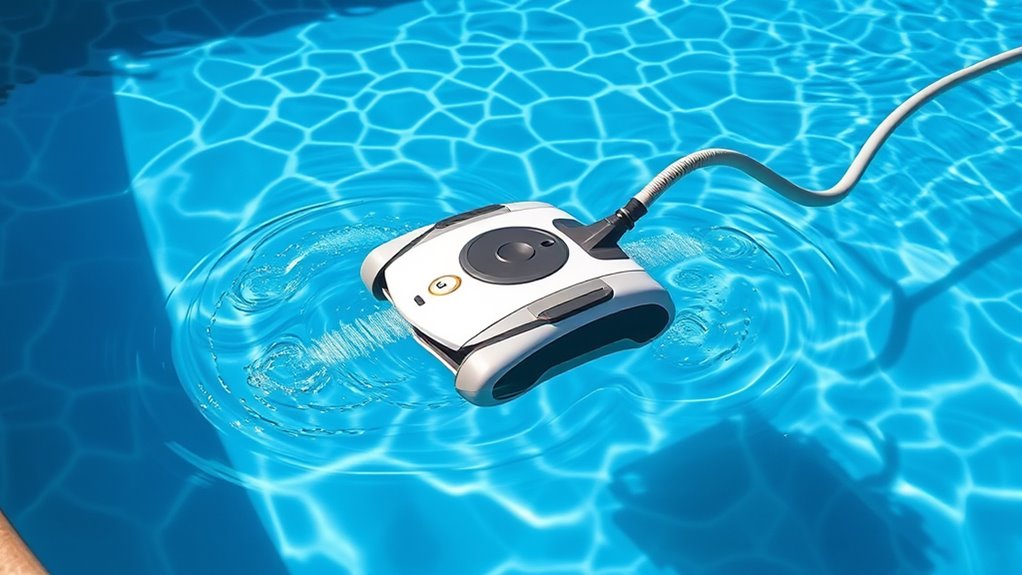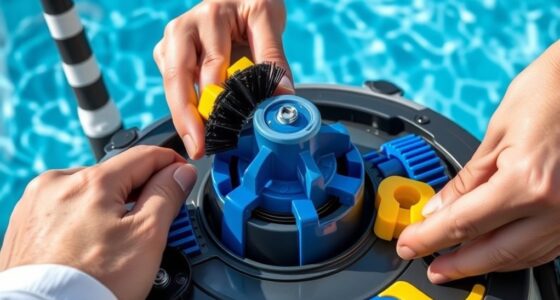A suction pool cleaner could be a great choice if you want an affordable, automatic way to keep your pool debris-free using your existing pump system. They efficiently remove leaves, dirt, and debris, promoting water circulation and reducing maintenance costs. However, they work best on smoother surfaces and may need frequent emptying during heavy debris seasons. If you want to learn more about whether a suction cleaner suits your pool, keep exploring the details.
Key Takeaways
- Suitable for small to medium pools with standard surfaces like plaster, vinyl, or fiberglass.
- Works best when connected to an existing pump and filtration system for efficient debris removal.
- Ideal if you prefer automatic, cost-effective cleaning with minimal maintenance and user involvement.
- Less effective on textured or rough surfaces; may require frequent emptying of debris containers.
- Compatible with various pool shapes and sizes, but ensure proper matching to prevent performance issues.
How Suction Pool Cleaners Work
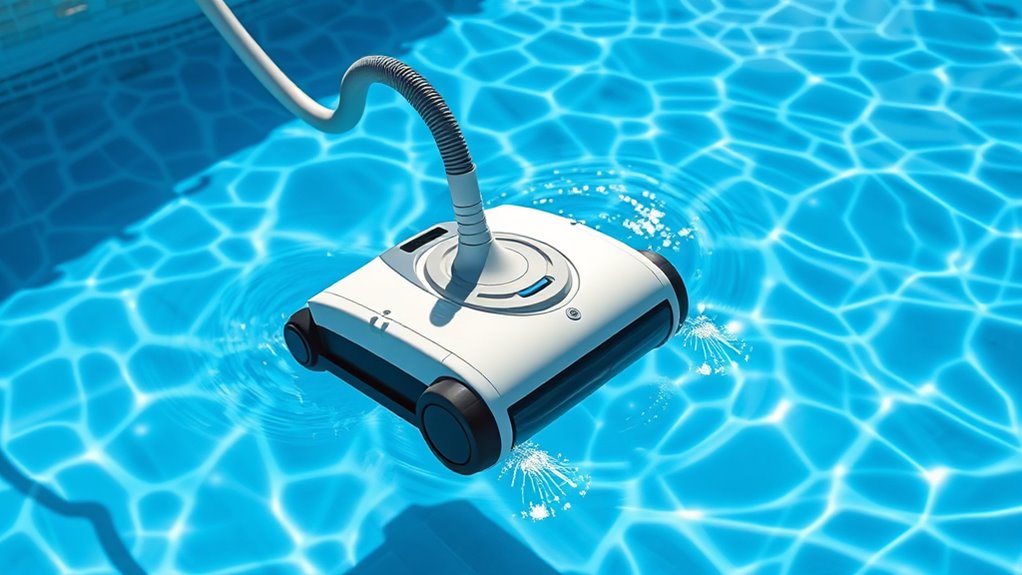
Suction pool cleaners work by connecting to your pool’s filtration system, using the pump’s power to move the cleaner across the pool surface. As it moves, it effectively removes debris from your pool liner, preventing buildup that can stain or damage it. Maintaining proper water chemistry is essential for ideal cleaning performance; balanced water reduces algae growth and mineral deposits that can clog filters or stick to the liner. The cleaner’s suction pulls dirt, leaves, and small debris into the skimmer or filter system, reducing the need for manual vacuuming. Because it relies on your existing pump and filtration setup, it’s an efficient way to keep your pool clean without extra equipment. Properly managing water chemistry ensures your pool remains sparkling and the liner stays in good condition, especially as automation technology continues to evolve in pool maintenance. Additionally, understanding filter system efficiency can help optimize the performance of your suction pool cleaner. Regular inspection and maintenance of your filtration system components can further enhance cleaning effectiveness and prolong the lifespan of your equipment.
Benefits of Using a Suction Pool Cleaner
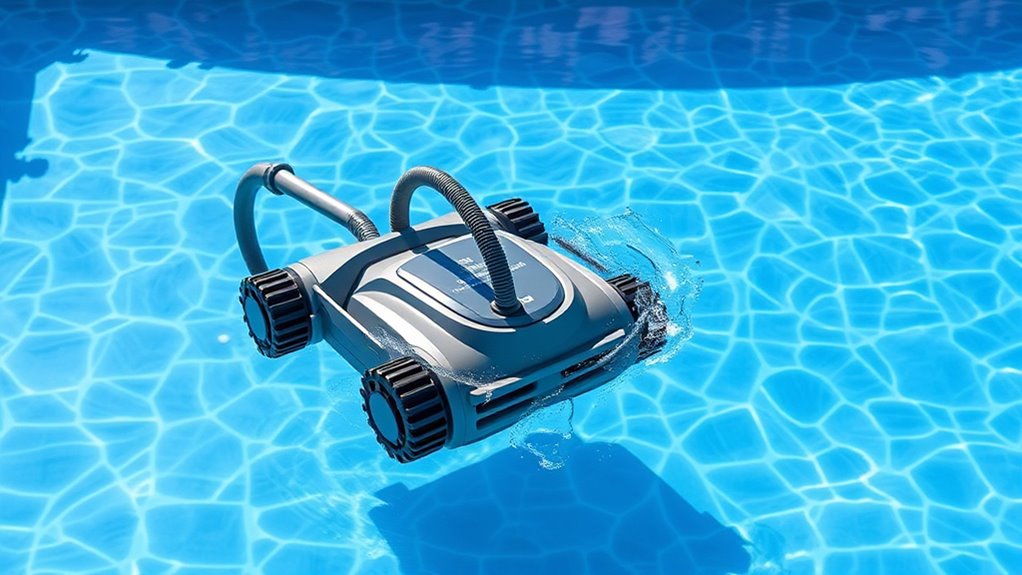
Using a suction pool cleaner makes removing debris quick and easy, keeping your pool spotless. It also helps you save money by reducing maintenance costs over time. With these benefits, maintaining a clean pool becomes less of a chore. Additionally, choosing the right pool cleaning tool can enhance efficiency and effectiveness in keeping your pool pristine.
Effective Debris Removal
Have you ever struggled to keep your pool free of debris? A suction pool cleaner can make a big difference. It consistently removes leaves, dirt, and other debris, helping maintain a clean swimming environment. When debris is cleared effectively, water circulation improves because the cleaner reaches every corner of your pool, preventing stagnant spots. This enhanced circulation supports better filtration and keeps algae and bacteria at bay. Plus, a cleaner pool promotes better pool safety by reducing slipping hazards caused by debris buildup. Using a suction cleaner ensures debris doesn’t settle on the bottom or cling to the sides, saving you time and effort. Additionally, top maintenance solutions can prolong your pool equipment’s lifespan by preventing blockages and reducing wear and tear. Regular use of a suction pool cleaner can also support effective water circulation, which is crucial for optimal pool health. Proper filter maintenance is essential to keep your cleaner functioning efficiently and to maintain water clarity. With reliable debris removal, you can enjoy a safer, healthier, and more inviting pool all season long.
Cost-Effective Maintenance
A suction pool cleaner offers a budget-friendly way to keep your pool maintained without frequent professional help. Its energy efficiency means it consumes less power compared to other cleaning options, saving you money on electricity bills. Plus, its design provides user convenience, allowing you to set it up and forget it while it automatically handles cleaning tasks. You won’t need to invest in costly maintenance or hire specialists regularly. Instead, the suction cleaner’s simple operation and effective debris removal keep your pool pristine at a low cost. Over time, this makes it a smart choice for pool owners looking to minimize ongoing expenses while maintaining a clean, inviting swimming environment. With less hassle and more savings, it’s a practical solution for cost-effective pool upkeep. Additionally, choosing a model with energy-efficient features can further enhance long-term savings and performance.
Limitations and Challenges to Consider
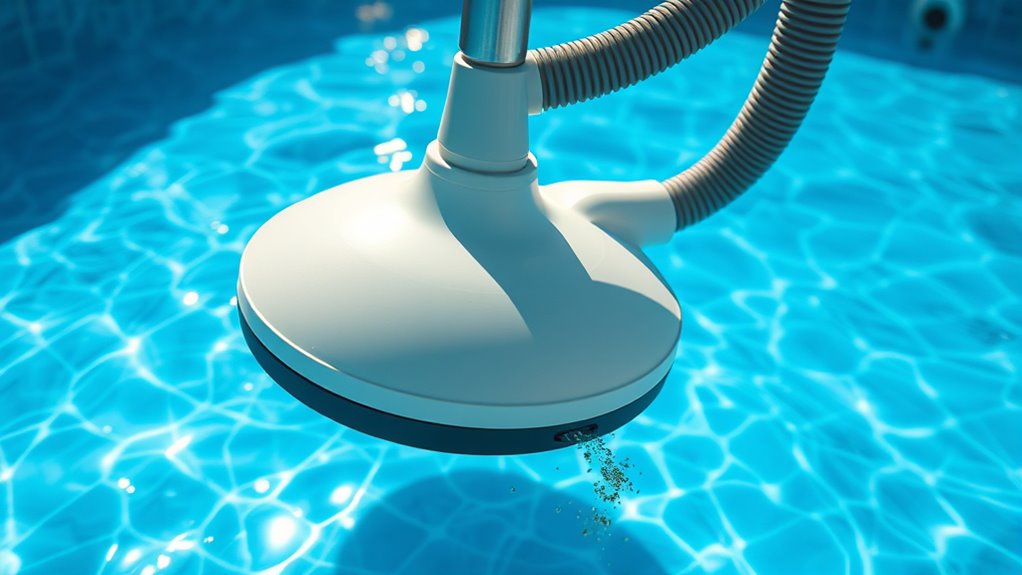
Suction pool cleaners have limitations you should be aware of before choosing one. They often have limited debris capacity, requiring frequent emptying, and depend on power sources, which can limit mobility. Additionally, they may struggle on textured surfaces, making cleaning less effective in certain areas. For example, surfaces with rough textures can impede the cleaner’s ability to maintain proper contact and suction. Moreover, the efficiency of these cleaners can be affected by system efficiency ratings, which influence how effectively they operate over time. It’s also important to consider that maintenance requirements can vary, impacting overall performance and longevity.
Limited Debris Capacity
Limited debris capacity is a significant challenge when using suction pool cleaners, as they can quickly become overwhelmed by larger or thicker debris. These cleaners typically have a small debris capacity, meaning you need to empty their storage solutions frequently during cleaning sessions. If your pool has a lot of leaves, twigs, or other sizable debris, this limitation can hinder efficiency and prolong the cleaning process. To manage this issue, consider using a debris net or skimmer to remove larger debris before running the suction cleaner. Regularly clearing the debris container ensures ideal suction power and keeps the cleaner functioning smoothly. Additionally, selecting a model with efficient debris management features can help reduce maintenance needs, especially during heavy debris seasons, making it a key factor to weigh before choosing a suction pool cleaner. Being aware of the debris capacity of your cleaner can also help you plan cleaning sessions more effectively and prevent interruptions. Incorporating advanced filtration systems can further enhance debris collection efficiency and extend the cleaner’s operational time. Moreover, choosing a model with high-performance motors can improve suction power and overall cleaning effectiveness, particularly in areas with persistent debris. Understanding the filter maintenance requirements of your cleaner can also improve its longevity and performance over time.
Power Source Dependence
Since suction pool cleaners rely on an external power source, their performance can be limited by the availability and type of power supply. Battery-powered models offer cordless convenience but depend on rechargeable batteries, which may run out mid-clean. Solar-operated cleaners use sunlight, reducing electrical needs but are less effective in cloudy weather or shaded pools. Both options can face challenges with inconsistent power. Additionally, the effectiveness of these cleaners can be influenced by filtration technology, which impacts their ability to remove debris efficiently. Proper maintenance and understanding of essential oils 101 can help optimize their performance and longevity. Incorporating Volkswagen Tuning principles such as engine optimization and component upgrades can serve as a metaphor for maintaining and enhancing your pool cleaning system for better efficiency and durability.
Difficulty on Textured Surfaces
Textured surfaces like pebble finishes, tile patterns, or rough pool floors can pose significant challenges for suction pool cleaners. These surfaces often reduce suction power, making it harder for the cleaner to pick up debris effectively. Here are some key issues to contemplate:
- Reduced Suction Power: Textured surfaces can block or limit debris flow, decreasing cleaning efficiency.
- Clogged Filters: Dirt and debris get trapped more easily on rough surfaces, leading to frequent filter clogs.
- Poor Adhesion: The cleaner may struggle to maintain contact, causing it to miss spots.
- Increased Wear: Rough surfaces can accelerate wear and tear on brushes and suction ports.
If your pool has textured surfaces, you might face these challenges, impacting overall cleaning performance.
Compatibility With Different Pool Types

Suction pool cleaners are generally compatible with a variety of pool types, but it’s important to check specifics before purchasing. Your pool’s material—whether plaster, vinyl, or fiberglass—can influence how well the cleaner works. Some models are better suited for certain surfaces and might struggle with textured or rough surfaces. Additionally, shape compatibility matters; round, oval, or kidney-shaped pools may require different cleaning paths or features. Make sure the cleaner you choose can navigate your pool’s shape smoothly without getting stuck or missing spots. Most suction cleaners are versatile, but verifying these details ensures ideal cleaning performance and longevity. By matching the cleaner to your pool’s material and shape, you’ll achieve better results and avoid potential issues down the line.
Cost and Maintenance Requirements
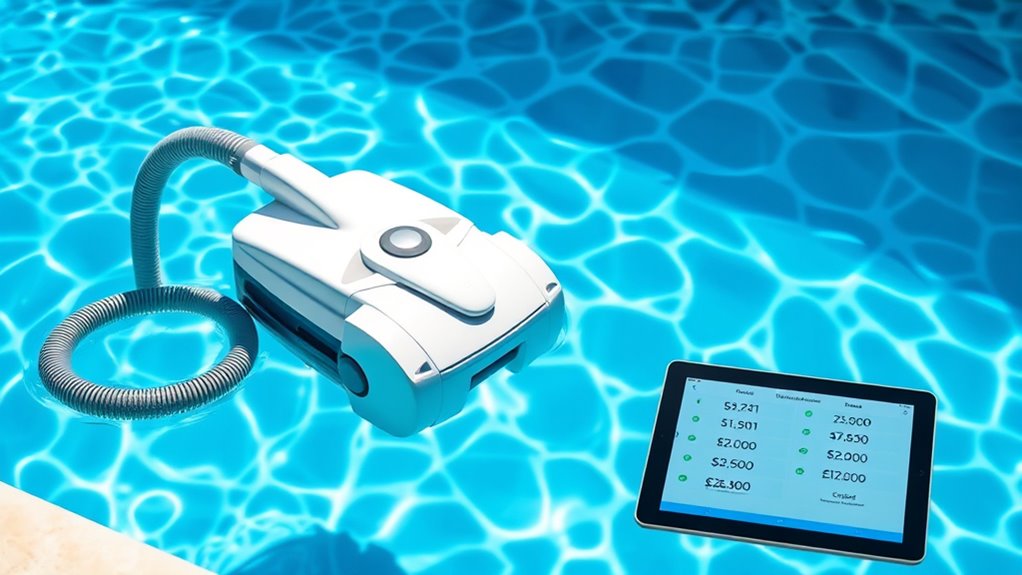
The cost of a suction pool cleaner varies depending on features, brand, and size, but it generally requires an upfront investment that can range from affordable to premium models. When doing a pricing analysis, consider these factors:
- Initial purchase price
- Warranty coverage to protect against repairs
- Regular maintenance costs like filters and brushes
- Potential upgrades or replacements over time
Affordable models may save you money initially but might lack durability, while premium options offer longer-lasting performance. Keep in mind that warranty coverage can reduce repair expenses and increase your long-term savings. Regular maintenance, such as cleaning filters and inspecting hoses, ensures your cleaner runs efficiently and extends its lifespan. Additionally, understanding Glycolic Acid Benefits for Skin can help you make informed decisions about product longevity and effectiveness, which is similar to evaluating the durability of your pool equipment. Properly maintaining your equipment, including filter cleaning, is essential for optimal operation. Balancing upfront costs with ongoing maintenance helps you choose a model that fits your budget and keeps your pool pristine.
Installation and Ease of Use
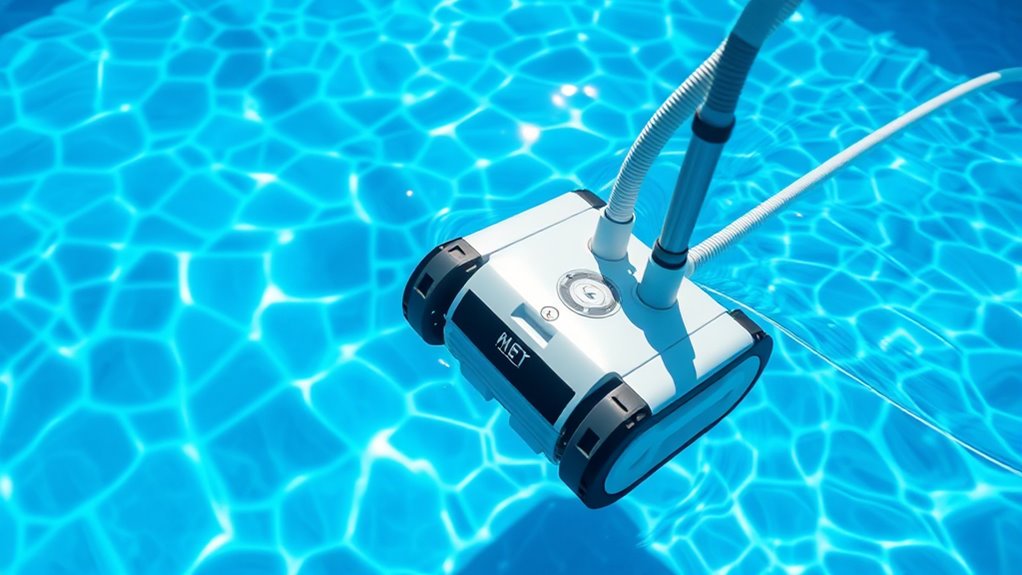
Installing a suction pool cleaner is typically straightforward and doesn’t require professional help. The installation process involves attaching the hose to your skimmer or dedicated suction port and ensuring the cleaner is properly connected. Once set up, you’ll find the ease of operation depends on the cleaner’s design and your pool setup. Most models are lightweight and easy to maneuver, making it simple to place and start the cleaner. You won’t need complicated tools or extensive instructions. Simply turn on your pool’s pump, and the cleaner will begin its work. Regularly check the hose connections to prevent leaks, but overall, the installation and daily operation are hassle-free. This simplicity makes suction pool cleaners a convenient choice for pool owners who want effective cleaning without complex setup.
Comparing Suction Cleaners to Other Pool Cleaning Options
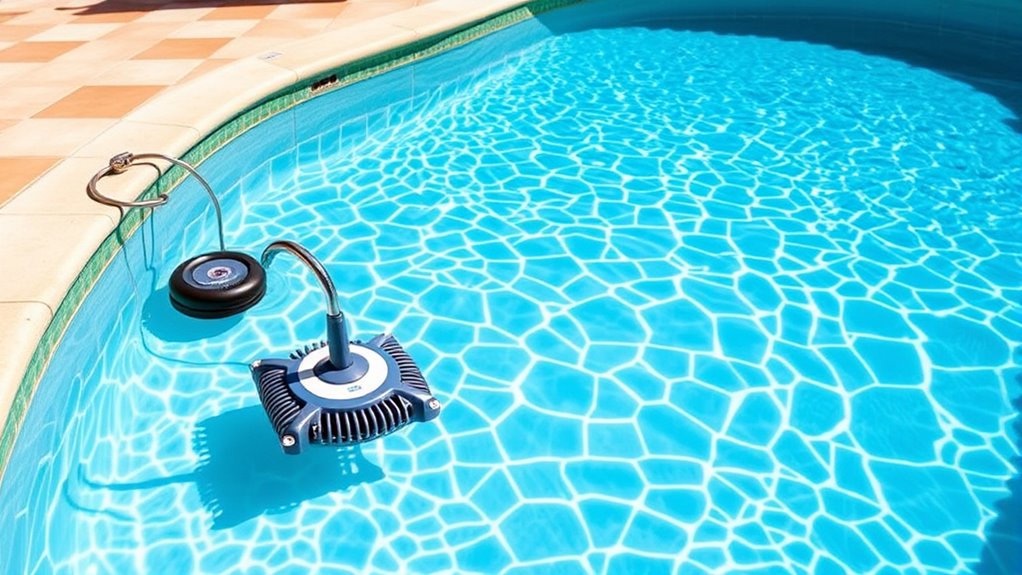
Ever wonder how suction pool cleaners stack up against other options? The choice depends on your pool size and desired cleaning speed. Here are four key comparisons:
Considering your pool size and cleaning speed helps determine if suction cleaners are the best choice.
- Robotic Cleaners: Faster cleaning and better for large pools but often more expensive upfront.
- Pressure Side Cleaners: Good for bigger pools, offering decent cleaning speed, but require additional equipment.
- Manual Skimming: Cost-effective and flexible for small pools, yet time-consuming and less thorough.
- Suction Cleaners: Ideal for small to medium pools with steady cleaning speed and simple installation, but may struggle with larger pools or faster cleaning needs.
Choosing the right option depends on your pool size and how quickly you want it clean.
Signs That a Suction Cleaner Is Right for You
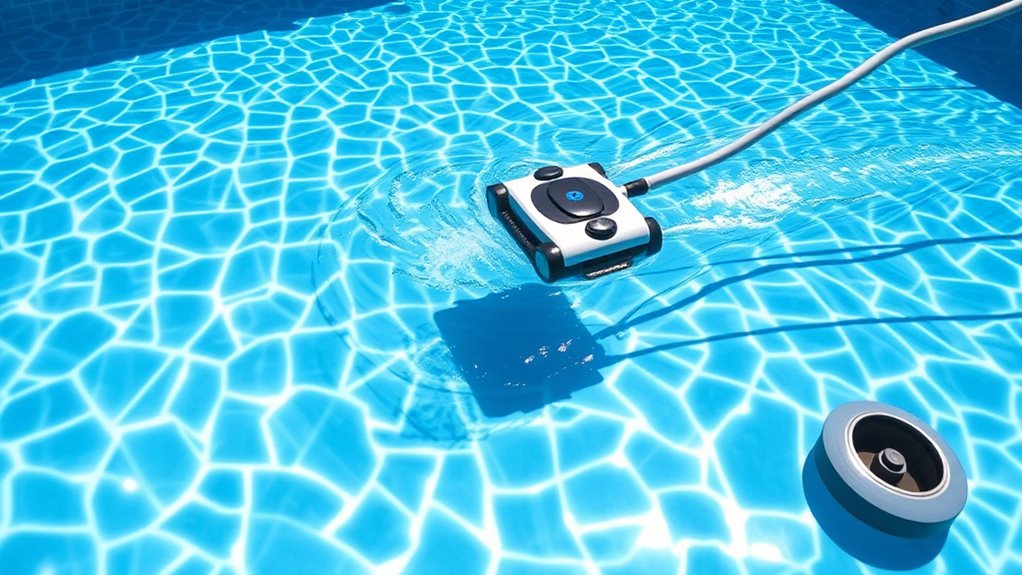
If you have a small to medium-sized pool and want a simple, cost-effective cleaning solution, a suction cleaner might be just what you need. If your pool has shallow areas or varies in depth, a suction cleaner can adapt easily, reaching all corners without extra effort. Additionally, water temperature plays a role—if your pool tends to warm up quickly or stays warm, a suction cleaner can help manage debris and algae buildup efficiently. You’ll notice if your pool’s depth makes manual cleaning cumbersome or if fluctuating water temperatures cause more debris, a suction cleaner can save time. It’s ideal for pools where consistent, straightforward cleaning is a priority, especially if you prefer an easy, low-maintenance option that works well across different pool conditions.
Tips for Getting the Most Out of Your Suction Cleaner
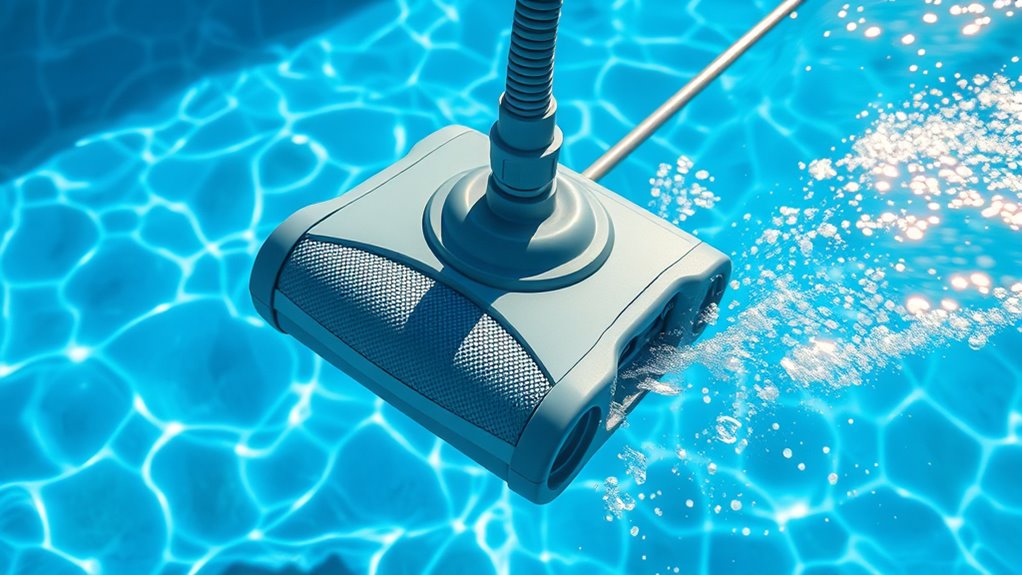
To maximize the effectiveness of your suction cleaner, regular maintenance is key. First, consider your pool size; larger pools may need more frequent cleaning to prevent debris buildup. Second, set a consistent cleaning schedule based on your pool’s usage and environment—this improves overall cleanliness. Third, check the cleaner’s hoses and filters weekly to ensure ideal suction and prevent clogs. Fourth, adjust the cleaner’s settings to match your pool’s shape and surface for better coverage. Regularly removing debris from the skimmer and brushing the pool walls also supports your cleaner’s performance. By staying on top of these tips, you’ll extend your cleaner’s lifespan and keep your pool sparkling. Proper maintenance tailored to your pool size and cleaning frequency makes all the difference.
Frequently Asked Questions
Can Suction Pool Cleaners Handle Large Debris Effectively?
You might wonder if suction pool cleaners can handle large debris effectively. These cleaners generally have a decent debris capacity, but their effectiveness depends on their suction power. Strong suction power helps them pick up larger debris like leaves and twigs, but some models may struggle with very bulky objects. If your pool has lots of large debris, look for a cleaner with higher suction power and ample debris capacity to keep your pool spotless.
How Often Should I Replace Parts on My Suction Cleaner?
You should follow a regular maintenance schedule for your suction pool cleaner, checking parts like brushes, filters, and hoses monthly. Part replacement depends on usage and wear, but typically, you’ll need to replace brushes every 6-12 months and filters every 3-6 months. Keep an eye on performance; if cleaning becomes ineffective, it’s time for part replacement to guarantee peak operation. Proper maintenance keeps your cleaner running smoothly.
Are Suction Cleaners Suitable for Saltwater Pools?
Suction cleaners are generally suitable for saltwater pools because they often feature saltwater compatibility and corrosion resistance. You should check the manufacturer’s specs to verify they’re designed to withstand the salt’s effects. Opt for models with durable, corrosion-resistant parts to prolong their lifespan. Regular maintenance and rinsing after use help prevent corrosion, making suction cleaners a practical choice for keeping your saltwater pool clean and well-maintained.
Do Suction Pool Cleaners Work With Variable-Speed Pool Pumps?
Did you know that 65% of pool owners report better cleaning efficiency with compatible equipment? Suction pool cleaners do work with variable-speed pool pumps, but you need to check pool pump compatibility to guarantee proper suction power. Using a cleaner with compatible pool pumps can also reduce maintenance needs, preventing damage caused by inconsistent flow. So, verifying your pump’s capacity helps the cleaner perform at its best and extends its lifespan.
Can I Use a Suction Cleaner in a Heated Pool Year-Round?
Using a suction pool cleaner in a heated pool year-round depends on your pool heating system and climate. If you maintain proper pool heating and perform year-round maintenance, a suction cleaner can work effectively regardless of season. Just make certain your pool remains clean and balanced, and check if your cleaner’s design suits heated water conditions. This way, you keep your pool pristine and ready for use anytime, all year long.
Conclusion
If you want a hassle-free way to keep your pool clean, a suction cleaner might be perfect. For example, Sarah installed one last summer, and now her pool stays spotless without daily scrubbing. Just weigh the advantages against your pool type and maintenance needs. With proper use, you’ll enjoy sparkling water and more free time. So, if you’re ready to simplify pool cleaning, a suction cleaner could be your best bet.
